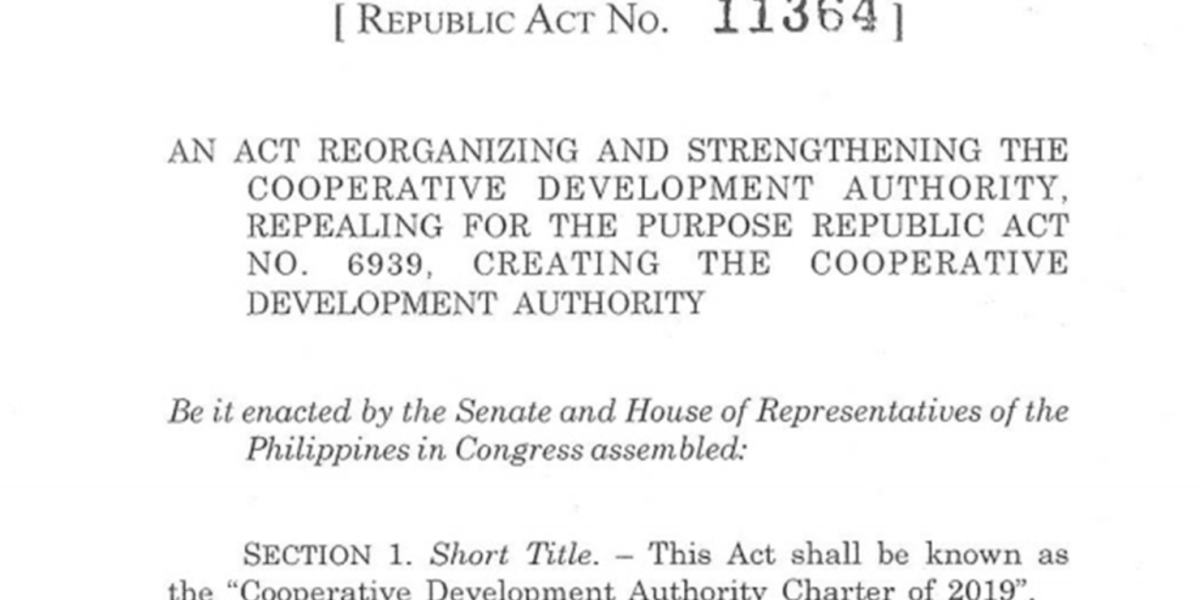CDA much stronger and busier under 2019 Charter
Twenty-nine years after it was created by Republic Act 6939, the CDA now has more teeth and more tasks, thanks to Republic Act 11364. President Rodrigo Duterte signed on August 8 the law reorganizing and strengthening the Cooperative Development Authority (CDA).
Twenty-nine years after it was created by Republic Act 6939, the CDA now has more teeth and more tasks, thanks to Republic Act 11364.
President Rodrigo Duterte signed on August 8 the law reorganizing and strengthening the Cooperative Development Authority (CDA).
Known as the CDA Charter of 2019 or Republic Act 11364, the law replot aces or repeals RA 6939 signed into law by President Corazon Aquino in 1990. RA 6939 detailed the tasks of the CDA in implementing the Cooperative Code of 1990, RA 6938.
Section 3 of the new law states the CDA “is hereby strengthened and reorganized to carry out the provisions of this Act and those of . . . Republic Act 9520, or the Philippine Cooperative Code of 2008.”
The new CDA Charter adds “teeth” to the CDA, giving the agency quasi-judicial powers, forming a data bank of co-ops, authorize establishment of branches and satellite offices of cooperatives (which earlier had been unregulated), recognize laboratory cooperatives, require co-ops to be disaster-ready with actual business continuity plans, administer donations, suspend or cancel registration, order and oversee dissolution and liquidation of co-ops, compel co-ops to call a general assembly, decide on disputes, issue subpoenas,
Among the key changes are the creation of an information system from the reports and other documents submitted by cooperatives (Sec 3h).
The authors of new CDA Charter have clearly begun to prioritize information. It may be recalled that the Dept. of Finance pushed for the TRAIN Law in 2018 that would have repealed almost all tax exemptions – including those enjoyed by co-ops. Co-op sector leaders protested, saying co-ops set aside the Cooperative Education & Training Fund and the Community Development Fund from their Net Surplus, and actually help Government. When the DOF leaders asked for data proving that co-ops had such impact in their communities, none of the leaders, including the CDA as the sole government regulatory agency for co-ops, present data.
Also for the first time, “apex organizations” was mentioned in law. Apex organizations, in simple terms, are federations of federations or alliances representing cooperatives. None of the previous laws on co-ops had ever mentioned “apex organizations” so it is deemed that this could lead to the recognition of the Philippine Cooperative Center to be recognized as the apex organization in the Philippines.
The PCC is currently composed of some 29 federations.
Sec 3 dd also tasks the CDA with collaborating with concerned agencies that can help co-ops. The CDA was placed under the Dept. of Trade and Industry in late 2018. The CDA is also mandated to coordinate with the academe for the education and training requirements of co-operators.
A new structure has also been set for the CDA. It will be led by a Board of Administrators
Throughout the text of the law, the phrase “in consultation” is used liberally.
Section 26 of the law reads: “The Board (of Administrators of the CDA) shall in consultation with the cooperative sector and other concerned agencies, formulate the IRR within ninety (90) days upon the effectivity of the Act.”
At a meeting of co-op leaders at the CDA headquarters on August 19, a CDA official revealed that a working draft had already been created and will be presented to the technical working group that will create the IRR.
The NATCCO Network, as a federation, will sit in the Technical Working Group, and provide inputs in the IRR which is expected to take effect in early November.
The NATCCO Network’s Member Relations Group will accept suggestions / inputs from primary co-op leaders.

